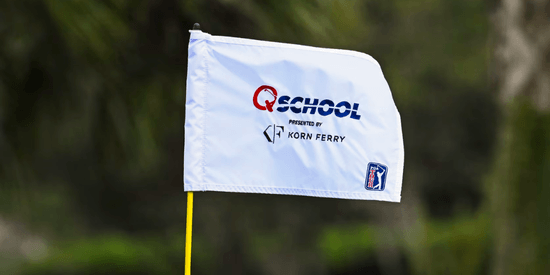U.S. Adaptive Open: Kipp Popert, Ryanne Jackson win Men's and Women's titles
7/12/2023 | by United States Golf Association
see also: View results for U.S. Adaptive Open Championship, Woodmont Country Club - South Course

England's Popert, and Florida's Jackson won the overall titles while 13 other players with disabilities were also crowned
Even so, the 96 players in the 2nd U.S. Adaptive Open, each competing in one of eight impairment categories as well as for the overall titles, were very much playing to win. When the dust settled, Kipp Popert of England and Ryanne Jackson of Seminole, Fla., came away as the overall men’s and women’s champions, respectively.
Popert, 25, was diagnosed with cerebral palsy at birth and has undergone numerous surgeries that have allowed him to continue compiling a strong record in adaptive golf competitions. He won the 2022 Golf for the Disabled (G4D) Tour Betfred British Masters and finished second in The R&A’s inaugural G4D Open this past May. Popert entered Wednesday’s final round as the 36-hole leader and fended off strong challenges from defending champion Simon Lee of the Republic of Korea and Conor Stone of Ireland, carding a 3-over-par 75 to win by one stroke with a 2-under 214 total.
“I worked really hard for many years,” said Popert. “I didn't envision winning it with a double [bogey on No. 18], but sometimes you’ve got to win ugly. It was good out there. I played well today. I’m extremely chuffed to win.”
Popert entered the second nine leading by one over Stone and two over Lee. On the par-5 15th hole, Popert converted a birdie to extend his lead to two, but things tightened considerably toward the end as he made a bogey on No. 17 and then hit his drive out of bounds on the 18th hole, leading to a double bogey. Lee had a 6-foot par putt on 18 that would have forced a playoff, but the putt slid by and Popert breathed a huge sigh of relief.
Jackson, a 25-year-old lefty who was diagnosed with a form of muscular dystrophy as a college freshman, did not have nearly as much stress in her final round. Her primary challenger was defending champion Kim Moore of Battle Creek, Mich., who started the day three strokes behind Jackson, an EMT who will attend paramedic school in the fall.
The two were grouped together – along with Natasha Stasiuk of Canada and Bailey Bish of Tucson, Ariz. – and Jackson increased her lead to five strokes over Moore with birdies on Holes 2 and 3. The margin slipped to two strokes when Jackson took double bogeys on the fifth and eighth holes, but Moore could not mount a challenge and Jackson played steady, even-par golf over her last 10 holes.
“I knew coming in that there were some new people entering the tournament that I hadn't heard of,” said Jackson. “I didn't know what to expect with their games, but I knew Kim Moore was going to be my biggest returning competitor since she was the reigning champ. So being here at the end is a very nice feeling.”
The following players take home medals for being the winners of their respective categories:
> Abigail Davis, Houston, Texas (arm impairment, women)
> Conor Stone, Ireland (arm impairment, men)
> Natasha Stasiuk, Canada (intellectual impairment, women)
> Simon Lee, Korea (intellectual impairment, men)
> Kim Moore, Battle Creek, Mich. (leg impairment, women)
> Mike Browne, England (leg impairment, men)
> Cindy Lawrence, Lehigh Acres, Fla. (multiple limb amputee, women)
> Evan Mathias, Indianapolis, Ind. (multiple limb amputee, men)
> Ryanne Jackson, Seminole, Fla. (neurological impairment, women)
> Kipp Popert, England (neurological impairment, men)
> Ann Hayes, Lee, Mass. (seated players, women)
> Max Togisala, South Ogden, Utah (seated players, men)
> Kurtis Barkley, Canada (short stature, men)
> Amanda Cunha, Kaneohe, Hawaii (vision impairment, women)
> Kiefer Jones, Canada (vision impairment, men)
What the Champions Receive
Both Ryanne Jackson and Kipp Popert were awarded gold medals and received custody of their respective U.S. Adaptive Open trophies for one year. They also each earn five-year exemptions into the championship.
Each of the 15 category winners earn exemptions into next year’s 3rd U.S. Adaptive Open, to be held July 8-10, 2024, at Sand Creek Station in Newton, Kan.
Notable
Kelsey Koch, 31, of Grand Blanc, Mich., is a first-time player in the U.S. Adaptive Open field who competed in the leg impairment category. Even though she didn’t play her best golf, it will be a round she will never forget. After Koch holed out on the par-4 ninth hole to finish her round, her caddie and longtime boyfriend Josh White dropped down onto a knee and presented Koch with an engagement ring, which she happily accepted.
On the men’s side, only one player broke par in Round 3 – Jesse Florkowski of Canada (arm impairment) and the lowest score among the women was the 2-over-par 74 turned in by overall champion Ryanne Jackson.
Jackson improved by one stroke in each of her three rounds, shooting 76-75-74 for a 9-over 225 total.
Jarrett Fultz of Queen Creek, Ariz. (neurological impairment) and Brandon Rowland of Jackson, Tenn., both improved their scores by 16 strokes over Round 2, tying for the biggest margin among the male competitors. Chris Oviatt of Milwaukie, Ore., competing in the women’s neurological impairment category, improved by seven strokes from Round 2 to Round 3, best in the women’s field.
Quotable
“It seems a little weird to think about being a champion, but it’s going to be awesome, seeing my name up there [in the USGA Museum’s Hall of Champions] with some of the greatest of the game.” – Ryanne Jackson, 25, Seminole, Fla.; overall women’s champion
“I think basically if you’re going to win, you just have to be your own biggest supporter out there. You can’t beat yourself up. I think that’s what I’m best at.” – Kipp Popert, 25, England; overall men’s champion
“Right now I’m a little emotional. I just think this is the greatest thing. Our whole goal is to come out and not for you to look at us as [having] disabilities but as golfers.” – Larry Celano, 54, Chandler, Ariz.; 4th place in men’s seated player category
“It feels great. I’m really proud of myself for how far I’ve come. It’s really fun seeing the hard work I put in. Now my goal is to get back to scratch on my handicap and hopefully maybe play some college.” – Max Togisala, 19, South Ogden, Utah; winner, men’s seated player category
“I definitely want young people who are visually impaired, doesn't matter if they’re boys or girls, to know that there are ways for you to have a lot of fun, even if you have a visual impairment. There are collegiate adaptive golf teams that you can join.” – Amanda Cunha, 19, Kaneohe, Hawaii; winner, women’s visual impairment category
About the U.S. Adaptive Open Championship
Inroduced in 2022, the U.S. Adaptive Open Championship is a 54-hole stroke play championship open to males and females, professionals and amateurs, with either physical impairment, sensory impairment (vision), or intellectual impairment, who have a W...
Most Popular Articles

2025 PGA TOUR Q-School Guide: Sites, Scores, and Who Advanced
Dec 5, 2025Second Stage is complete and Final Stage awaits at Sawgrass — follow every Q-School leaderboard and the players still chasing
2025 LPGA TOUR Q-Series: Final Qualifying Stage FINAL SCORING
Dec 8, 2025Helen Briem earns medalist honors, 31 players headed to the LPGA next year
2025 PGA TOUR Q-School Final Stage: Ewart Leads Five New TOUR Card Winners
Dec 14, 2025A.J. Ewart topped Final Stage at TPC Sawgrass, leading five players who secured PGA TOUR membership for 2026.
Australian Open at Royal Melbourne: Preview, amateur bios, and how to watch
Nov 30, 2025Rory McIlroy headlines one of the championship's top fields in years - at least four amateurs will have their chance at gloryInside Gil Hanse’s Restoration of Baltusrol’s Upper Course: A Return to Tillinghast’s
Dec 11, 2025Renowned architect Gil Hanse reveals how he brought Baltusrol’s Upper Course back to life by honoring A.W. Tillinghast’s original